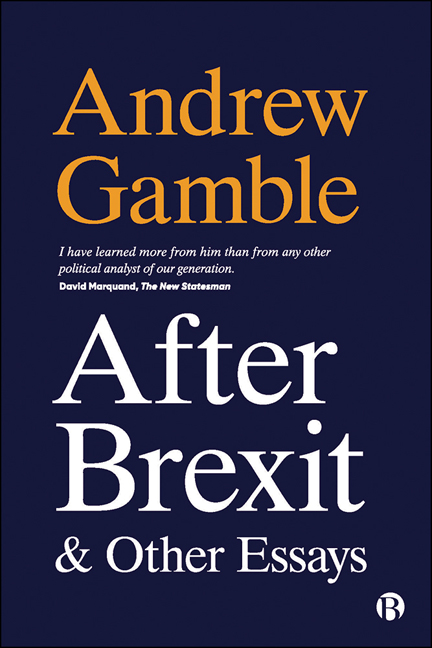Book contents
- Frontmatter
- Dedication
- Contents
- Preface
- Introduction: Historical Contexts
- Notes on the Essays
- 1 After Brexit (2019)
- 2 Explanations of British Decline (1999)
- 3 The European Disunion (2006)
- 4 The Anglo–American World View (2019)
- 5 The Free Economy and the Strong State (1979)
- 6 Thatcherism and Conservative Politics (1983)
- 7 Economic Growth and Political Dilemmas (1983)
- 8 The Crisis of Conservatism (1995)
- 9 The Thatcher Myth (2015)
- 10 Theories of British Politics (1990)
- 11 The Constitutional Revolution in the United Kingdom (2006)
- 12 What’s British about British Politics? (2016)
- Epilogue: Last Thoughts
- Notes
- Acknowledgements
- Index
1 - After Brexit (2019)
Published online by Cambridge University Press: 22 December 2021
- Frontmatter
- Dedication
- Contents
- Preface
- Introduction: Historical Contexts
- Notes on the Essays
- 1 After Brexit (2019)
- 2 Explanations of British Decline (1999)
- 3 The European Disunion (2006)
- 4 The Anglo–American World View (2019)
- 5 The Free Economy and the Strong State (1979)
- 6 Thatcherism and Conservative Politics (1983)
- 7 Economic Growth and Political Dilemmas (1983)
- 8 The Crisis of Conservatism (1995)
- 9 The Thatcher Myth (2015)
- 10 Theories of British Politics (1990)
- 11 The Constitutional Revolution in the United Kingdom (2006)
- 12 What’s British about British Politics? (2016)
- Epilogue: Last Thoughts
- Notes
- Acknowledgements
- Index
Summary
In the referendum held on 23 June 2016 the British people voted by a narrow margin (52 per cent to 48 per cent) to leave the European Union. 37 per cent of the total electorate voted Leave. The result introduced great uncertainty into the future path of British politics and the shape of its political economy. The debate has been shaped by partisan perspectives. Some have called it the most disastrous peacetime event in British history, the greatest act of self-harm ever inflicted, others have described it as a liberation from a corrupt and failing organisation which allows the British people to take back control and Britain to be Britain again. The result has placed the long-term future of the UK union in doubt, since both Northern Ireland and Scotland voted Remain, and it raises questions once again about the UK's place in the world, particularly the nature of its relationship with the United States and its future defence and security cooperation with its European allies.
The UK had endured three difficult decades after 1945, adjusting to the loss of empire and world power. After the Suez debacle it tried and failed twice to join the European Economic Community (EEC), finally succeeding in 1973. The decision was then ratified by a twothirds majority in a referendum in 1975. Joining the EEC was not the economic panacea for the many ills of the British economy which some of its advocates had hoped, partly because it occurred during the major recession and prolonged crisis of the 1970s, but it did appear to many observers that it had settled Dean Acheson's concern ten years before that Britain had lost an empire and not yet found a role. Membership of the European Economic Community gave Britain a role at the heart of the European project for economic integration which complemented and supported the parallel structures of NATO for defence and security. For forty years, membership of the EU was a crucial anchor of British policy, and although the UK was often reluctant to back deeper integration, it was enthusiastic in its support for the creation of the single market, and then for the enlargement of the EU after the collapse of the Soviet Union in 1991.
- Type
- Chapter
- Information
- After Brexit and Other Essays , pp. 15 - 36Publisher: Bristol University PressPrint publication year: 2021



